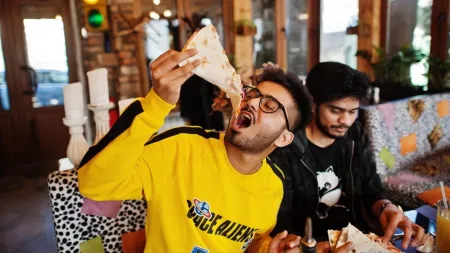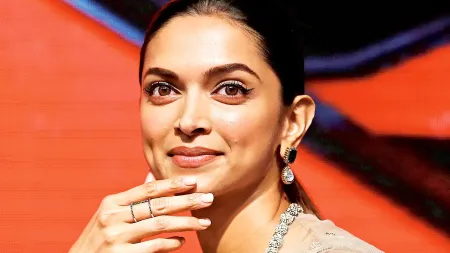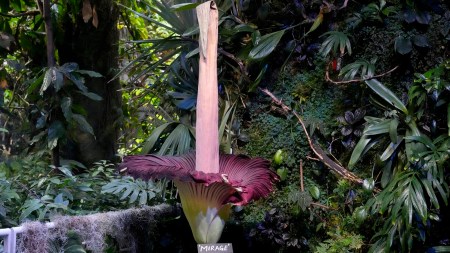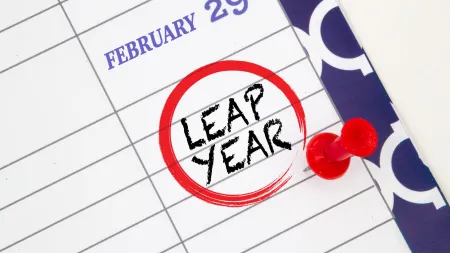‘Children are a great test audience’: Anu Vaidyanathan on how motherhood shaped her comedy
Comic, athlete, engineer, writer, filmmaker — Anu Vaidyanathan dons many hats. From becoming the first Asian triathlete to finish Ultraman Canada to having her memoir, Anywhere But Home, longlisted for a movie adaptation at the Mumbai International Film Festival in 2016, her list of laurels is immense. Despite this, she finds her role of being a daughter and mother most fulfilling.
Vaidyanathan, who has toured multiple countries for her show BC:AD (Before Children: After Diapers), calls her children her first audience, where she can test and try her jokes.

In a candid conversation with indianexpress.com, the multi-hyphenated personality talks about traversing different roles, how her kids make her a better comedian, her foray into the world of filmmaking, and more.
Q: You have a multifaceted career—from comic, athlete, to filmmaker to engineer—which role brings you the most satisfaction?
Anu Vaidyanathan: I think being a mom is a full-time job, and a very satisfying one if you play the role well. The truth of the modern family is that we are very independent — we don’t have the support structure of extended family. So, being there for each other makes it a full-time job.
I’m in that tunnel where I have young children and old parents. So, I feel the role of a parent is precious. With the number of really satisfying relationships decreasing, I feel like this is the role that is most fulfilling because it’s closest to home and easier to manage. You don’t have to travel at six in the morning and get your work done.
While at work, I have never juggled five things at once because I don’t believe in multitasking. If you take things one step at a time, you’re more likely to see what you can do with yourself rather than spreading yourself thin.
View this post on Instagram
A post shared by Anu Vaidyanathan (@anu.vaidyanathan)
Q: What is your parenting style?
Anu Vaidyanathan: I like to joke that I’m like Harrison Ford’s dad, but not because I love my books more than my kids. That’s just a joke. I think my parenting style is quite hands-off.
My children are very young, so I feel like it has to be a mix of things. You can’t let a child do whatever they want and say, “Yeah, but I believe in free love, go stick your finger in an electric socket.” That’s not going to happen. So, you have to have some semblance of structure and protection, and you are the caretaker at that point.
I’ve discovered that when I’m with my kids, I’m fully present. I don’t think about work or other things. That’s been important for me to cultivate as a habit because, as women, we have very connected minds, and it’s not easy for us to shift focus.
I let them do what they want, but if they need support to achieve something, I’ll go the extra mile. I won’t force both my children to attend the same class just because it’s easier for me. Parenting shouldn’t feel easy, especially in this day and age when you’re not surrounded by a hundred people to help you. We do our own laundry and make our own meals, so you have to be clear about your priorities. If my children want to pursue different interests, that’s my priority. It’s not my priority to complete projects that I can’t see the end of. Children need you for a small part of their lives, and it’s crucial to be there for them.
View this post on Instagram
A post shared by Anu Vaidyanathan (@anu.vaidyanathan)
Q: How has parenthood influenced your comedy?
Anu Vaidyanathan: My kids are the reason I became a comedian in the first place. I’m an engineer by training, so you can imagine being in a classroom full of very serious children with nothing interesting to say. But then you realise how foolish you are only when you have a child, and that child only reacts to things like colours, a good joke, or whatever funny face you make. So, I think any artistic endeavour I can put my name to today is because I’ve had children. I don’t think without them, I’d have had the realisation that there’s a life beyond engineering and being an engineer.
One of the earliest lessons I learnt as a parent is that you don’t have too many tools at your disposal. You can’t explain E=mc² to a child or why you can’t crack a physics problem. They don’t care. They just want you to be amusing. Children are a great test audience because they’re very honest. They don’t care about your structure or how you deliver a joke. They either laugh or they don’t. As a comedian, you need that quick feedback to know what’s working and what’s not. Children are your first audience, and while they may not understand all your jokes, they help you refine your comedic persona. They keep you grounded and remind you not to take yourself too seriously.
Q: You were the first Asian woman to complete Ultraman Canada. How was that experience for you, and what was your fitness routine like during the training period?
Anu Vaidyanathan: Completing Ultraman Canada was a very individualistic experience. It was a test of my physical and mental strength. When you’re preparing for such an endurance event, you have to set your canvas as large as you want it. You can’t defer to fear or doubt.
During my time, there wasn’t much information or knowledge available. There weren’t a plethora of coaches. I completed the Ultraman on a secondhand bike, without sponsors or aerodynamic equipment. The beauty of it was making do with what I had. My ultimate goal wasn’t the bike or the gear — it was the finish line. The great adventure was asking myself “can I do this?” And that was the driving question that propelled me from the start to the finish of the race.
Being a triathlete has helped me cultivate a strong sense of self. When you’re out there, alone with your thoughts for miles, you learn who you are. You learn to survive despite the lack of external validation. It was important for me to see what I could accomplish because it set a concrete example for my children. As a parent, it’s crucial to live out what you preach to your children because eventually, they’ll realise that you’re not infallible. If you’re dishonest about your abilities and experiences, they may not trust your guidance.
View this post on Instagram
A post shared by Anu Vaidyanathan (@anu.vaidyanathan)
Q: What went into writing your memoir, Anywhere But Home?
Anu Vaidyanathan: Non-fiction is the love of my life for many reasons. Not just because it chronicles real people, but also because it tells stories in a way that resonates deeply. I take nothing away from the beauty of fiction, but personally, I’ve always been drawn to non-fiction. Some of the greatest journalistic pieces have been penned by non-fiction writers and journalists. One of my favourites is the author who wrote about the Everest expedition — Into Thin Air by Jon Krakauer. He happens to be one of my favourite journalists. I admire his adventurous spirit and his ability to translate his outdoor experiences into captivating narratives. Writing a memoir felt natural to me, as there weren’t many leaps of imagination required.
During the process of writing, I found myself seeking advice from fellow journalists. I’d often lament about my struggles with grammar, sentence structure and capturing the reader’s interest. Crafting a compelling story requires discipline and skill. It’s not just about transcribing life — it’s about shaping it into a narrative that engages and resonates with readers. Writing became a meditative process for me, much like the solitary nature of endurance sports like triathlons and running. Writers, I believe, tend to be somewhat misanthropic, preferring solitude in the woods over the hustle and bustle of everyday life.
My decision to write a memoir was largely influenced by my editor, Karthika VK at HarperCollins. She understood the essence of the story I wanted to tell and didn’t impose unnecessary constraints. Instead, she encouraged me to breathe life into the narrative, allowing it to unfold naturally. Writing a memoir as a woman athlete presented its own challenges. There weren’t many precedents to follow, especially in the realm of sports. Unlike memoirs by literary writers, which often delve into personal encounters and relationships, sports memoirs tend to be more episodic, recounting the journey through various races and challenges. It required a blend of memory and imagination to craft a compelling narrative.
Overall, writing the memoir was a fulfilling experience, particularly during a time when I was pregnant and unable to engage in physical activities. It allowed me to reflect on my journey as an athlete and share my experiences with others.
Q: How did you get into the world of filmmaking?
Anu Vaidyanathan: I hate to say this, but I had the unfortunate experience of being an assistant director on The Seagull, which was a live theatre play. This was before I started my journey in comedy. At the time, I was solely focused on writing for film or other projects. Live theatre demands a lot — an entourage, if you will. There’s no such thing as a single director who can bring a play to life, especially one as lengthy as The Seagull, which runs over two hours. So, any piece of theatre worth watching requires a well-oiled machine behind the scenes.
During my time as an assistant director, I learnt a great deal. I observed how actors warm up, and I became familiar with the unique challenges each actor faced. Our leading lady, in particular, encountered various issues, which added a comical element to the set. Unfortunately, the play never came to fruition. After three trial runs, it became evident, even from an audience perspective, that it wasn’t working, and we had to pull the plug. This experience reinforced my belief that theatre necessitates a well-functioning team.
Similarly, filmmaking also requires an entourage. While the process may differ slightly, it’s equally collaborative. However, theatre remains aspirational for me due to limited resources. Film, on the other hand, feels more accessible and democratic. After my book was longlisted for the inaugural Mumbai Word-to-Screen Festival, I received interest from several producers, including offers from major studios. However, during subsequent meetings, I realised that the proposed adaptations felt formulaic and unsatisfying. A friend in advertising encouraged me not to compromise my vision, which led me to explore filmmaking further.
I went to film school while pregnant and learnt the craft of filmmaking from the ground up. It’s been a challenging but rewarding journey. I love the collaborative nature of filmmaking and the way it combines different art forms. As a woman director, it’s a political journey, but I’ve learnt to navigate it and find joy in the process. Comedy became a natural outlet for me during the downtime between film projects. It’s therapeutic and allows me to connect with audiences in a different way. Overall, filmmaking has become a passion project for me, and I’m excited to see where it takes me in the future.
View this post on Instagram
A post shared by Anu Vaidyanathan (@anu.vaidyanathan)
Q: What can we expect from you in 2024?
Anu Vaidyanathan: A year is a very long time. So yes, there will be more shows, hopefully a few more films. We’re trying to put together a feature film, which is longform. It depends on a lot of people coming together. I’m really hoping to find a few collaborators who support women filmmakers. And I don’t think of time anymore as a 12-month block.
I love building, because I think that I’m a very tactical, tactile person. I love using my hands and my brain, pieces of paper to build a show or film or whatever. So, in 2024, you can expect an amount of Post-its that’s twice the size of 2023. I have lots of scripts half-finished, some are finished, out in the world. I think you can just expect more of that and definitely lots of days where things just don’t go my way here.
Disclaimer: The copyright of this article belongs to the original author. Reposting this article is solely for the purpose of information dissemination and does not constitute any investment advice. If there is any infringement, please contact us immediately. We will make corrections or deletions as necessary. Thank you.





